#PUV Modernization
Text
OneNETnews EXCLUSIVE: Local Transport Group in Negros Oriental opts out of Nationwide Transport Strike ensures continued operation amidst challenges of PUJ Modernization Programme
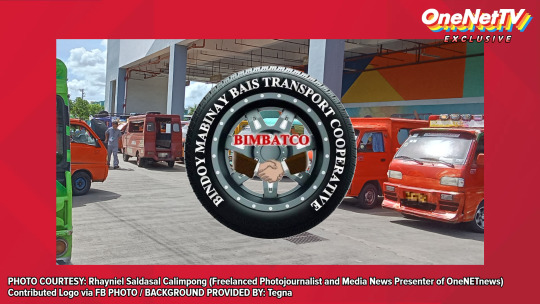
DUMAGUETE, NEGROS ORIENTAL -- National transport groups, namely the Malayang Alyansa ng Bus Employees at Laborers para sa Karapatan sa Paggawa (MANIBELA) and Pagkakaisa ng mga Samahan ng Tsuper at Operator Nationwide (PISTON) declares a nationwide transport strike on Sunday (November 19th, 2023), which is for the unconsolidated individuals. However, Central Visayas-wide including Cebu, Bacolod, Dumaguete City and Negros Oriental, have chosen not to partake in this regional transport strike during the upcoming Holiday and New Year's Eve celebrations in the early first weekend of 2024.

(FILE PHOTO COURTESY for REPRESENTATION: Negros News Online)
Romeo Subaldo, a former News Chief of ABS-CBN Bacolod (now Kapamilya Channel: Bacolod) and current Regional Multimedia News Anchor of Favorite Music Radio & Digicast Negros, shared his insights on the matter during the final minutes of his local radio newscast of 'Arangkada Negrosanon Balita' at 6:30am on Monday morning (Bacolod local time). Subaldo emphasized that the jeepney franchises in Western Visayas and Negros Occidental will not participate in the regional strike: "I think sa mga probinsya po na sang Transport Strike sa Metro at Mega Manlia, wala ma gupod ang mga provinces naton… Sa mga taga-Metro at Mega Manila nila ng Transport Strike, kana ka nausang Department of Education (DepEd) kahapon ng Linggo (Nobyembre 19th, 2023) na way klase sa Maynila na may Transport Strike. Pero diri sa aton, padayon na pag-biyahe sa mga di pa-pasaherong mga salakyan", Subaldo said in the exclusive radio interview to OneNETnews via Facebook LIVE video.
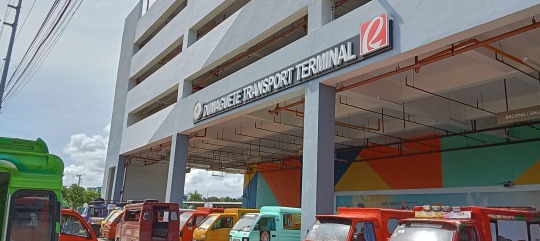
In an exclusive phone patch interview, where it was independently verified to OneNETnews as one local transport group in-charge of Bindoy-Mabinay-Bais Transport Cooperative (BIMBATCO) named Rey Alpeche, a representative in-charge of the Bindoy-Mabinay-Bais Transport Cooperative (BIMBATCO) in Dumaguete City and Negros Oriental, confirmed that they are not part of the nationwide transport strike. Alpeche highlighted the importance of paperwork consolidation and their close monitoring of the cooperatively-owned jeepney units: "So far in Negros Oriental, maliliit lang yung persiyento ang unconsolidated. Sa aming kooperatiba, lahat kami consolidated [ng BIMBATCO] na single indibidual mga sa tingin ko siguro, mga 20 to 30 ganun. Lahat naman na cooperatiba dito is nag ko-consolidate, hindi kami sasali sa transport strike. Ano naman silbi kasi consildated na po kami. I'm meaning to say that, hindi po talaga phase out dere-diretso. Yung ang unconsolidated ng kina-kansela na prankisa nila o franchise", Alpeche said in an online media interview on Friday afternoon (December 29th, 2023).
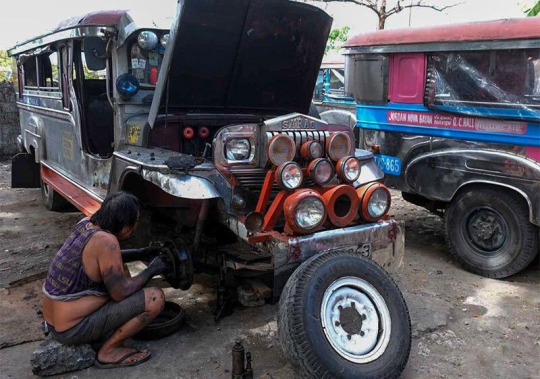
(CONTRIBUTED FILE PHOTO COURTESY for REPRESENTATION: The Philippine Star)
He emphasized that their cooperative of BIMBATCO is already consolidated and therefore unaffected by the phase-out of older jeepney units in Negros Oriental. While concerns regarding commuting without modernized jeepneys in the future, and the availability of unemployment benefits were raised from the SSS or GSIS (Social Security System or Government Service Insurance System), Alpeche clarified that these issues do not directly impact BIMBATCO and other localized transport groups: "Yung amining nila ng gobyerno is to consolidate. Consolidation is yung mga papeles ng iko-consolidate kasi hindi na po biro na yung gobyerno na for example… Hindi kaya ng LTFRB o Land Transportation Franchise and Regulatory Board na mag-monitor ng indibidual na prangkisa o operators. Kailangan mo i-monitor yung sa kooperatiba kasi, yung sa sinabing cooperative ay mo-monitor ng mga [Jeepney] units", he added.

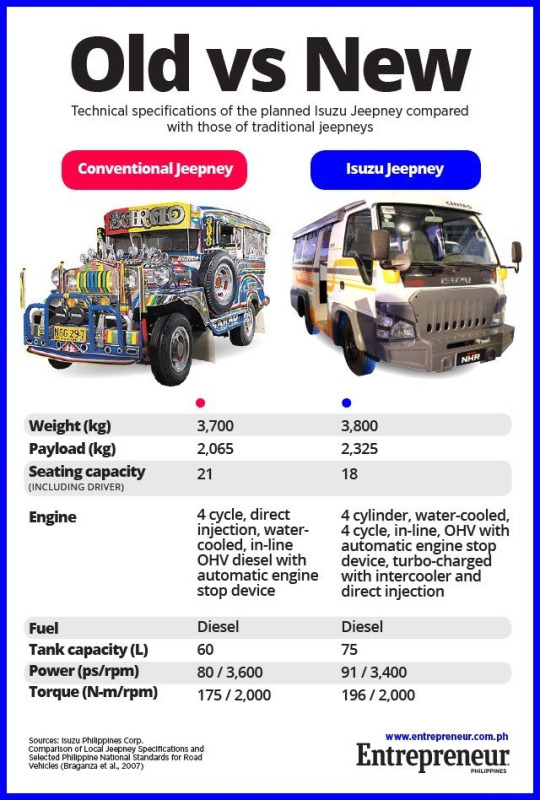
(FILE PHOTO COURTESY: Google Images)
Loans in Negros Oriental, with the example of government-owned banking 'Landbank' cannot cover all the jeepney vehicle modernization expenses and was yet to be revisted in the Q1 of 2024 or later. Nonetheless, BIMBATCO needs to reassess areas for modernization based on its passenger volumes: "Kailangang po talaga e-revisit mo na yung [sinabing probinsya] ng Negros Oriental kasi, sa amin ngayon may modernized jeepney galing isa, taas namin kinuha yun. Ang problema, hindi talaga kaya ang umo-utang ta sa banko. Pag umo-utang pa ron, siguradong hindi na ka mababayad. Sa Negros Oriental ang problema kasi, wala po tayo mga masyadong volume ng pasahero o passengers. So, kailangan po naming na e-revisit muna yung every area na kailangan na modernisasyon".
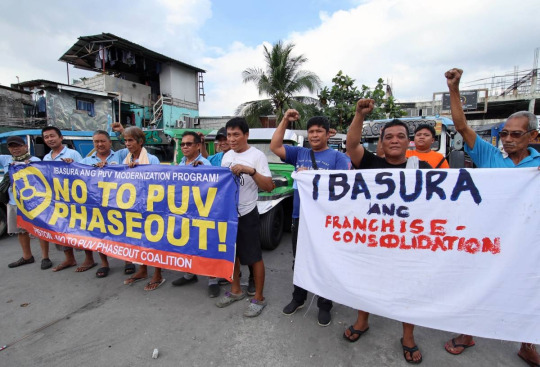
Alpeche suggested that if drivers were to become unemployed and experience a decrease in income for commuting purposes, they would need to be re-hired, despite of the upcoming nationwide transport strike including Negros Oriental. He expressed the drivers' resistance to the boundary system and emphasized that drivers earn more than the operators themselves: "Meron nang dahan-dahan na tayong phase-out, yung mga driver din yun is ire-hire din. Saan pong kami kukuha ang driver sa kanila rin? Kasi ayaw ng mga drivers na itong nangyari. Ayaw kasi ng mga drivers is boundaring system yun ng mga drivers. Mas malaki pa yung kita kaysa sa operator".
The consolidation process for BIMBATCO began in 2018 or 2019 and was soon to expire by 2024, as early as 6 years before the December 31st, 2024 deadline on Sunday. Ferdinand "Bongbong" Romualdez Marcos Jr. stated that there would be no extensions for the nationwide and regional jeepney phase-out for the unconsolidated individuals, urging sincerity from the government. He also pointed out the lack of communication with the Land Transportation Franchise and Regulatory Board (LTFRB) in Negros Oriental: "Dapat unahin natin yung LTFRB, we do talk with the cooperatives na kabisado yung ruta. Kasi, kami ang nakakaalam so ruta kung pwede bang dagdagan, pwede bang tanggalan ng [Jeepney] units at i-modernize. Kasi, kami yung apektado at kami yung may alam pero, pag wala namang threat nandito sa Negros Oriental sa ngayon, hindi nai-tolerate yan. We don't talk to the government. At saka, pag wala pang consolidation po sa kanila ng ilang taon na palaging ine-extend, paano naman kami which is so unfair for us na hindi na ko-consolidate as early as 2018 o 2019, na palagi sinabing ine-extend. Pag ayaw talaga ang consolidasyon, ayaw na din talaga ng extensyon". Alpeche expressed frustration with the extension of consolidation deadlines and the unfair treatment of cooperatives that have already consolidated to them. Alpeche expressed frustration with the extension of consolidation deadlines and the unfair treatment of cooperatives that had already consolidated.
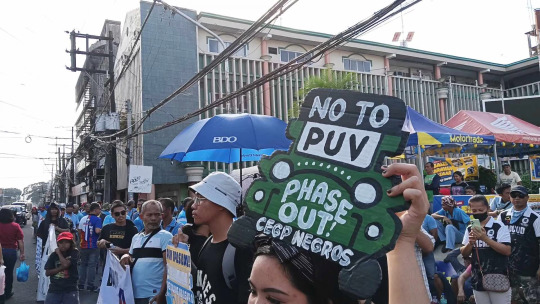
(FILE PHOTO COURTESY: Bayan Negros)
Fortunately in conclusion… Western and Central Visayas, including Negros Occidental and Negros Oriental, are not participating in the regional transport strike. BIMBATCO has ensured the necessary paperwork and franchises to secure the continued operation of their regional vehicle franchises without any revocations or phasing out in the new year by January 1st, 2024.
The transportation crisis in Metro and Mega Manila is a significant concern for MANIBELA and PISTON. Drivers are pushing for the modernization of new jeepney vehicles under the Public Utility Jeepney & Public Utility Vehicle - Modernization Programme (PUJ/PUV-MP) as a last resort to preserve the driving culture associated with older jeepneys. However, individual Filipino drivers cannot afford this potential upgrade.
OneNETnews has learned that Negros Oriental will no longer participate in the local transport strike for now, as confirmed by Alpeche of BIMBATCO. They have sought legal assistance to ensure proper registration and consolidation by the Land Transportion Office (LTO) and LTFRB, allowing them to operate safely and normally in Central Visayas.
A big SPECIAL THANKS to Neil Ceriño Rio of DYGB-FM 91.7 MHz's Power91FM and Fil News Balita: Cable TV 6 in Dumaguete City for their assistance in contacting BIMBATCO and facilitating our phone patch interview and local news report. Also, you can listen a full phone patched interview provided below the source links. Thank you!
PHOTO COURTESY: Rhayniel Saldasal Calimpong (Freelanced Photojournalist and Media News Presenter of OneNETnews)
CONTRIBUTED LOGO via FB PHOTO
BACKGROUND PROVIDED BY: Tegna
SOURCE:
*https://archive.org/details/onenetnews-interviews-with-bimbatcos-rey-alpeche [Exclusive Audio Interview from OneNETnews with Rey Alpeche - Dec292023]
*https://www.topgear.com.ph/features/feature-articles/puv-modernization-program-jeepney-phaseout-guide-a4354-20230310-lfrm [Referenced Editorial News Article via Top Gear Philippines]
*https://www.rappler.com/voices/ispeak/analysis-rethink-public-utility-vehicles-transportation-modernization-focus-commuters/ [Referenced Editorial News Article via Rappler]
*https://www.pna.gov.ph/articles/1213731 [Referenced News Article via Philippine News Agency]
*https://mb.com.ph/2023/11/20/iloilo-city-unaffected-by-transport-strike [Referenced News Article via Manila Bulletin]
*https://watchmendailyjournal.com/2023/12/09/transport-strike-mulled-bacolod-transport-group-protest-vs-franchise-consolidation/ [Referenced News Article #1 via Watchmen Daily Journal]
*https://watchmendailyjournal.com/2023/12/13/impending-phase-2-transport-groups-bacolod-refuse-join-transport-strike/ [Referenced News Article #2f via Watchmen Daily Journal]
*https://www.sunstar.com.ph/cebu/cebu-transport-groups-will-not-join-3-day-strike [Referenced Mini News Article from SunStar: Cebu]
*https://www.facebook.com/100063703909926/posts/668507635282694 [Referenced FB News Article via The NORSUnian]
and
*https://www.facebook.com/107637454505360/posts/107640491171723 [Contributed BIMBATCO Logo via FB PHOTO]
-- OneNETnews Team
#local news#dumaguete#negros oriental#central visayas#public utility vehicle#public utility jeepney#culture#commuting#PUJ Modernization#PUV Modernization#transport strike#MANIBELA#PISTON#BIMBATCO#jeepney#phase out#awareness#fyp#exclusive#first and exclusive#OneNETnews
0 notes
Text



Earlier, the Philippine National Police threatened to violently disperse and arrest transport workers and commuters taking part in the protests against the PUV Modernization program in Manila.
According to Inquirer.net, the Secretary of the Presidential Communications Office has stated that the Dec. 31 consolidation deadline will not be extended.
24 notes
·
View notes
Text
NO TO JEEPNEY PHASEOUT !!!!!!
SAY HELLO TO A WORSENED TRANSPORT CRISIS BY 2024
By: Mariella Angela H. Olden (December 28, 2023 | 9:25 PM)
Following a meeting with transportation officials, President Ferdinand Marcos Jr. said on December 12 that no further extensions for consolidation of public utility vehicles (PUV) shall be granted.
One of the cultural markers of Philippine identity is the jeepney. Jeepneys have been the primary mode of transportation for Filipinos due to its affordability and accessibility, particularly for students and workers. Furthermore, it has traditionally been the primary occupation of drivers and operators.
In June 2017, the government established the Public Utility Vehicle Modernization Program (PUVMP), intending to replace and eventually phase out traditional jeepneys to improve public transportation. However, with the impending phaseout of jeepneys by December 31, 2023, drivers and operators will be forced to purchase costly modern vehicles supported by the government.
Data from the Land Transportation Franchising and Regulatory Board (LTFRB) indicates that five days before the consolidation deadline, 31,058 traditional jeepneys, or 73.5% of them in Metro Manila, have yet to be consolidated. These unconsolidated units are highly not a minority.
Why should drivers, operators, commuters, and workers fight back? Among the many effects of the PUVMP is the increase in the minimum fare that will continue to make Filipinos suffer. The PUV Modernization program is a business. Corporations and large businesses will take over and have the advantage of raising fares to pay for expensive "modern jeeps." In contrast, this is a big disadvantage to the families of the drivers and operators, who will sink into debt due to the burden of the monthly payment of the modernized vehicle.
In addition, the Department of Energy and LTFRB has reported that the number of registered vehicles in the Philippines exceeds 9 million. Just over 250,000, equivalent to 2% of jeepneys, make up the total.
More detrimental effects of this program include the modern jeepney being way more expensive than the traditional jeepney. The price of a typical jeepney ranges from P150,000 to P250,000. The cost of operating a modern e-jeepney will rise by 1,766.7% to P2.8 million for drivers and operators. Although P160,000 will be given as a subsidy according to LTFRB, which amounts to a mere 5.7% of the jeepney's entire cost, jeepney drivers will be forced to make at least more earnings each day to be able to settle their loan if they were to switch to the modern jeepney.
By the year 2024, the mass transport crisis in the country will worsen. The government cannot fill such a large and significant gap in public transport in the country. With the influx of imported cars, many local manufacturers and industries will be affected.
The PUVMP program is forcefully erasing one of the main parts of our identity as Filipinos and only in favor of a few rich and foreign interests, making the Filipino masses suffer, further impoverished, and left behind.
Drivers, operators, commuters, and workers—
Unite and fight for #NoToJeepneyPhaseout #NoToPUVPhaseout #NoToPUVModernizationProgram!
#philippines#news article#news writing#journalism#writer#publication#jeepney#notopuvphaseout#notojeepneyphaseout#notopuvmodernizationprogram
17 notes
·
View notes
Text
OPINION: STOP THE E-JEEP! #NoToJeepneyPhaseout
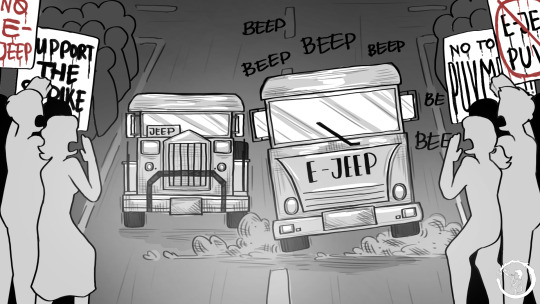
Commuter or not, every Filipino is familiar with jeepneys. Once dubbed “King of the Roads”, jeepneys are a symbol of Philippine culture and resourcefulness, as they were made from converted jeeps left by American troops after World War II. As the most popular public transport vehicle in our country for decades, these jeepneys are now at risk of disappearing, causing public uproar.
The controversy surrounding the phasing out of jeepneys first sparked in 2017 when the government launched the Public Utility Vehicle Modernization Program (PUVMP). The program’s goal is to replace the old model jeepneys with modern electronic jeepneys (e-jeeps) that are claimed to guarantee cleaner emissions and improved safety. This has been met with several worries that could adversely affect the Filipino populace.
Public unrest over the jeepney phaseout has been going on for years. The consolidation deadline for Public Utility Vehicles (PUVs) which included jeepneys, UV Expresses, and Filcab units was extended three times. The first was due to the COVID-19 pandemic and multiple protests from transport groups, which affected the government’s original plan to consolidate PUVs in March 2020. As a result, it was rescheduled at the end of last year, December 31, 2023. The second extension was on January 31, 2024, to allow unconsolidated PUVs to ply their routes with the stipulation of being barred from joining cooperatives and corporations. The third and “final” deadline was on April 30, 2024—three months after the last deadline—to allow driver-operators one last time to consolidate, or else they would not be allowed to ply their routes. Amid these several deadlines, protests and strikes are unwavering as dissents push for the PUVMP to be suspended, arguing that imposing deadline extensions does not address the structural problems of the modernization program.
One day before the “final” deadline, the Land Transportation Franchising and Regulatory Board (LTFRB) declared that unconsolidated jeepneys have a 15-day leeway to continue their usual routes before they are impounded. Again, this is another smokescreen from the systemic issues brought by the modernization program. The PUVMP must be suspended, as it ostensibly presents more problems than solutions. If the PUVMP truly is for the people, why is there a persistent and contentious pushback by the public?
Enforcing deadlines and giving grace periods for jeepney drivers only delays—the government must suspend the PUVMP and reevaluate its effectiveness. Displacing and disenfranchising jeepney drivers from their livelihoods defeats the purpose of an inclusive and sustainable program as the PUVMP endorses itself to be.
Who are those affected?
Jeepney drivers are most affected by the modernization program. If they choose not to consolidate with cooperatives and corporations or cannot afford an e-jeep alone, their vehicles will be impounded, taking away their only source of income. Additionally, commuters, UP Diliman constituents, and other sectors also have to bear the cost of the PUVMP due to the policies and funds allocated to this program.
The transport group for jeepney drivers, Pagkakaisa ng mga Samahan ng Tsuper at Opereytor Nationwide, more commonly known as PISTON, is the leading opposition group against the PUVMP. First established in 1981, PISTON serves as an organization that aims to promote the welfare and democratic rights of jeepney drivers. In 2013, they launched a campaign against the oil price hike, directed at the country’s main petroleum companies, namely Petron, Shell, and Chevron. Since the government has revealed plans to phase out jeepneys over 15 years old, they have been organizing protests against the PUVMP, criticizing its anti-poor policies and prioritizing for-profit corporate consolidation.
The PUVMP pressures jeepney drivers to switch to e-jeeps or new combustion engine vehicles that meet Euro IV emission standards which only permit carbon monoxide (CO) emissions of 1.0g/km for gasoline and 0.5g/km for diesel vehicles. Units and parts that make up the e-jeep are imported from other countries, which is why they are priced as high as PHP 3 million. While the modernization program offers subsidies of PHP 160 thousand through loan programs by the Development Bank of the Philippines (DBP) and the Land Bank of the Philippines (LBP) to help offset the costs, this amount is only 5.7% of the total cost of a modern jeepney. Jeepney drivers state that they will need to make around PHP 3.5 thousand each day to pay off the debt from switching to an e-jeep, but at the moment, they only make around PHP 2 thousand a day.
The large amount of money that needs to be spent transitioning to modern e-jeeps is the main concern of dissent to this program. Replacing a huge fleet of jeepneys requires massive resources, taking away from vital sectors such as education and healthcare. Additionally, the PUVMP disproportionately affects low-income citizens—specifically, jeepney drivers who mostly come from low-income families and struggle to meet the high e-jeep cost. The debt burden forces them to work longer hours just to break even, negatively impacting their livelihood. Jeepney drivers worry that the transition to e-jeeps or new combustion engine vehicles will exacerbate their financial burdens and force them to work longer hours just to break even.
Furthermore, units from local manufacturing companies such as eFrancisco Motor Corporation and Sarao Jeepneys are still priced at around PHP 2.5 million, further putting jeepney drivers at odds with the financial burden of the PUVMP. With large corporations dominating the market and the PUVMP’s policy to consolidate driver-operators to cooperative-led fleets, this raises concerns of corporate takeover and the economic marginalization of jeepney drivers. Since large companies are the ones who have the capacity to fully adhere to the program, jeepney drivers are left disenfranchised because of their financial disadvantage.
Commuters are also affected heavily by this program. Modern jeeps usually charge higher fares because, aside from the initial cost of modernization, their maintenance and repair costs are higher than the traditional jeepneys’. This adds more financial problems to Filipinos already facing higher living expenses as a result of inflation rates. Moreover, unfamiliar technology could present a significant challenge for traditional drivers transitioning to modern jeepneys, leading to potential operational difficulties and increased maintenance expenses.
Constituents of UP Diliman (UPD) share similar concerns. The UP Transport Group (UPTG), which consists of jeepney drivers from all routes around the campus such as Ikot, Toki, UP-Pantranco, UP-Philcoa, and UP-Katipunan, organized a silent strike on December 13, 2023, in protest of the earlier December 31 deadline. Based on interviews with the UPD Vice Chancellor for Community Affairs Roehl Jamon, UP jeepney drivers may have to comply with the modernization. According to Jamon, the only two options they have are for the university to pay for the units themselves, which cost about PHP 1.4 to 3 million each, or for the university to partner with transport cooperatives that already own modernized units and invite them to service the campus, which is the less expensive option between the two. Although the latter is cheaper, this still gives way for corporations to take advantage of the modernization program.
Jeepneys are extensively used by UP college students and students of UP Integrated School (UPIS) for commuting to and from the university campus because they charge less than other PUVs. However, these fares could be completely changed by the PUVMP’s effect on jeepney availability and rates, possibly altering their daily commutes by making them spend more on transport alternatives or by forcing them to look for different routes. This might put additional financial burden as well as longer hours of travel in their everyday life, affecting not only their academic performance but also their general welfare.
Moreover, the PUVMP is taking attention and funding from other sectors that have more pressing needs. In particular, the Department of Education (DepEd) is significantly impacted by lack of funding. Classroom and teacher shortages have been notable areas of concern with an estimated 165,444 classrooms and nearly 90,000 teachers needed. According to DepEd, PHP 105 billion would be needed each year up until 2030 to address the classroom shortage, while PHP 5.6 billion would be needed to hire 20,000 teachers in the upcoming school year, as discussed in the Senate plenary deliberations on the proposed 2024 national budget. Aside from the education sector, the Department of Health (DOH) has been grappling with vaccine shortages, namely pertussis, which has led to 54 infant deaths since the beginning of the year. According to the United Nations Children’s Fund (UNICEF), in 2022, the Philippines was among the top 5 contributors to the 18 million zero-dose children in the world. Despite this and multiple warnings from health authorities, the Philippines still hasn’t fully addressed this vaccine gap, leaving one million unvaccinated Filipino children vulnerable and susceptible to life-threatening diseases such as polio, measles, and tuberculosis. In light of these issues, resources should be prioritized in these matters instead of the PUVMP. Action must be taken immediately to address these pressing concerns and ensure the well-being of the Filipino people.
Are E-jeeps really the “better option”?
According to a study by the Center for Energy, Ecology, and Development (CEED), jeepneys only make up about 2% of the total registered vehicles in the nation and PUVs only contribute about 15% of the total particulate matter emissions in Metro Manila. If the PUVMP aims to transform our public transportation into becoming more sustainable and environmentally friendly, this number does not justify the relentless pressure on jeepney drivers to consolidate. The PUVMP will only contribute 2% to the country’s vehicles that cause pollution. This raises the question of the significance of its impact on saving the environment and reducing emissions in the long run. Additionally, modern jeepneys still run on fossil fuels, such as petroleum oil, defeating the purpose of the program’s goal of creating a more environmentally friendly public transport system. In the same study by CEED, it was argued that solely focusing modernization efforts on jeepneys to reduce air pollution would be negligible. Taking this into account, the government should instead consider upgrading traditional jeepneys to meet the proposed emission standards which would be cheaper for the program.
Furthermore, as said in a paper by the UP Center for Integrative and Developmental Studies, drawing from the current rate of assembly of modern jeepneys, it will take an estimated 270 years before all traditional jeepneys in the country are replaced. This begs the question of why the government keeps enforcing deadlines when it will take almost three centuries before all jeepneys are replaced with e-jeeps.
The PUVMP, while well-intentioned, presents a flawed solution. The environmental costs being too high, the unjust burden on the poor, and the uncertain consequences of such a drastic transition are strong arguments for reconsideration. The government should consider other options like rehabilitating existing jeepneys and using cleaner-burning fuels. One example that can be improved with the government’s help is the rehabilitated jeepney proposed by the Libmanan Transport Service Cooperative (LIBTRASCO). This model includes all government-specified features of the modernized jeepney—such as a side door, a higher ceiling, bigger windows, and even stabilizers to account for the increased height. Compared to e-jeeps, these rehabilitated models only cost around PHP 400 thousand to PHP 500 thousand, making them more affordable for jeepney drivers. Though the rehabilitated jeepney still uses the jeepney’s diesel engine, it can still be adapted to use a Euro 4 engine and even include air conditioning. If the government chooses to work with LIBTRASCO and retrofit the rehabilitated jeepney as an alternative, the Philippines can then improve its transport system while keeping its traditional jeepneys and people’s livelihoods by prioritizing affordability, inclusiveness, and a sustainable future.
Modernization shouldn’t be at the expense of the workers. The primary reason why many are aggressively opposing the program is that the welfare of jeepney drivers was not carefully considered when they should be the center of the solution. For the past years that the modernization program has been implemented, instead of listening to the pleas and concerns of jeepney drivers, commuters, and other constituents, the government has kept imposing the jeepney consolidation and resisting any demands by the public.
Taking all of this into account, we must request the government to prioritize policies that consider the money and power of all citizens, especially those from poor backgrounds. This includes subsidizing the move towards modern vehicles or examining other options that do not oppress marginalized communities. Instead of pushing jeepney drivers to consolidate and buy e-jeeps, the government should consider exploring and supporting initiatives that use cleaner-burning fuels and retrofitting existing jeepneys to meet emission standards to help maintain the environment in its sustainable state without overhauling the iconic jeepney fleet.
Above all else, this transition must be led by the workers—jeepney drivers whom the public has relied on for decades. Development must be made with the public in mind, not without.
// by Kela Alcantara & Xia Mentes
References:
Abarca, C. (2024, March 21). Calabarzon, Metro Manila top classroom shortage list – DepEd. INQUIRER.net. https://newsinfo.inquirer.net/1921036/fwd-on-public-classroom-shortage#:~:text=The%20estimated%20total%20number%20of,country’s%20classroom%20shortage%20by%202030
Ansis, JC (December 14, 2015). "Piston: Continuing to fight for the transport sector". CNN Philippines. https://web.archive.org/web/20190131083905/http://cnnphilippines.com/news/2015/12/14/piston-protests-continuing-to-fight-for-transport-sector.html
Bautista, P., Moya, R. (2023, September 3). Jeepney modernization program: Drivers have a steep price to pay. Philstar.com. https://www.philstar.com/headlines/2023/09/03/2293549/jeepney-modernization-program-drivers-have-steep-price-pay
CEED Office. (2018, November). Just Transition in the Philippines. CEED. https://ceedphilippines.com/just-transition-in-the-philippines/
Conde, M. (2019, November 16). Transport coop makes pitch for ‘affordable, safe’ rehabilitated jeepney. RAPPLER. https://www.rappler.com/nation/244909-camarines-sur-transport-cooperative-rehabilitated-jeepney/
Dimalanta, R. Atienza, J. Samonte E. (2023). Putting Transport Workers and Commuters First: The Route to Just Transition in Public Transport Modernization. UP CIDS Policy Brief. ISSN 2619-7286.
Gatarin, G. (2024), Modernising the ‘king of the road’: Pathways for just transitions for the Filipino jeepney. Urban Governance. 4(1). 37-46. https://doi.org/10.1016/j.ugj.2023.11.002
Golez, P. (2024, January 24). Marcos extends jeepney consolidation deadline til April 30. POLITIKO. https://politiko.com.ph/2024/01/24/marcos-extends-jeepney-consolidation-deadline-til-april-30/daily-feed/
Latoza, G. (2023, December 15). What are UP’s plans for commuters amid PUVMP? Tinig ng Plaridel. https://www.tinigngplaridel.net/up-transport-puvmp/
Magramo, K. (2024, January 16). Philippines jeepneys: Will the loud, colorful vehicles soon disappear from the roads?. CNN. https://edition.cnn.com/2024/01/16/asia/philippines-jeepney-phase-out-strikes-intl-hnk/index.html
Mendoza, T. C. (2021, February). Addressing the “blind side” of the government’s jeepney “modernization” program. University of the Philippines Center for Integrative and Developmental Studies. 1-69. ISSN 2619-7456.
Mondoñedo-Ynot, L. (2024, April 10). April 30 is final deadline for Puv Consolidation. SunStar Publishing Inc. https://www.sunstar.com.ph/manila/april-30-is-final-deadline-for-puv-consolidation
Ombay, G. (2023, November 9). DepEd lacks nearly 90,000 teachers - Pia Cayetano. GMA News Online. https://www.gmanetwork.com/news/topstories/nation/887851/deped-lacks-nearly-90-000-teachers-pia-cayetano/story/
Pabustan, D. (2017, September 21). Euro 4, what does it mean and why do we need it?. AutoDeal.https://www.autodeal.com.ph/articles/car-features/euro-4-what-does-it-mean-and-why-do-we-need-it
Philippine Daily Inquirer. (2024, April 14). DOH’s Lack of Vaccine Urgency. INQUIRER.net. https://opinion.inquirer.net/172935/dohs-lack-of-vaccine-urgency
Presidential Communications Office. (2024, January 24). PBBM approves three-month extension of PUV Consolidation. https://pco.gov.ph/news_releases/pbbm-approves-three-month-extension-of-puv-consolidation/
RAC. (n.d.). Euro 1 to Euro 6 guide – find out your vehicle’s emissions standard. https://www.rac.co.uk/drive/advice/emissions/euro-emissions-standards/
Relativo, J. (2023, December 28). Unconsolidated jeepneys, UV Express “allowed to operate” until Jan. 31, 2024. Philstar.com. https://www.philstar.com/headlines/2023/12/28/2321963/unconsolidated-jeepneys-uv-express-allowed-operate-until-jan-31-2024
Relativo, J. (2024, April 30). Unconsolidated jeepneys given “15-day leeway” after consolidation deadline. Philstar.com. https://www.philstar.com/headlines/2024/04/30/2351543/unconsolidated-jeepneys-given-15-day-leeway-after-consolidation-deadline
Reyes, R. O. (2024, January 29). Jeepney drivers rejoice “partial victory” for phaseout extension. SunStar Publishing Inc. https://www.sunstar.com.ph/tacloban/jeepney-drivers-rejoice-partial-victory-for-phaseout-extension#:~:text=approved%20the%20extension%20for%20franchise
Rivas, R. (2023, March 7). In numbers: Why jeepney phaseout is anti-poor, will do little for environment. RAPPLER. https://www.rappler.com/business/numbers-why-government-phaseout-jeepneys-anti-poor-do-little-environment/
Santos, J. (2024, February 7). Consolidation extension is not what the protest demands. Philippine Collegian.https://phkule.org/article/1106/consolidation-extension-is-not-what-the-protest-demands
7 notes
·
View notes
Text
Nagtry ako sumakay sa modern jeepney. Hindi ako natuwa. Front seat ako kanina,pero hindi ako komportable sa upuan ko, sumakit ang balakang ko. Ansakit sa ulo ng AC, or baka masakit na talaga ulo ko kanina ?... Ang tagal pa umalis, super pinupuno ??? wala bang passenger limit yon ?? kasi pasakay pa ng pasakay along the way e, mga matatanda patatayuin nyo?? Pano pag hindi na kaya ng lamig ? edi ang inet ?? Hindi nakakamodern kung hindi komportable ang pasahero. Feel ko, mas hindi okay ang experience kapag punong-puno doon mismo sa loob ng jeep na yon. Tangina dikit dikit. Mayghadd!! Okay siguro if hindi masyadong madami ang pasahero.
Traditional jeepneys pa rin ako, mas mura pa pamasahe. Mas okay pa air ventilation. Legit, ansakit ng likod ko. Okay sana if isa lang sa unahan eh, kaso pinilit na dalawa, nasa may window seat ako sa front, may sandalan, ung katabi ko wala. Haynako. Okay lang dalawa sa unahan, if sa traditional na jeep kasi, mas malaki leg space don, mas naiituwid mo paa mo?? sobrang lapad din kasi ng balikat ko, parang hanger!!! Ansakit talaga hays.
kaya tamaa!! suportahan ang mass transport strike!! hindi sila ang problema!!
NO TO JEEPNEY PHASEOUT!!!
NO TO PUV PHASEOUT!!!!
YES TO BETTER PUBLIC TRANSPORT!!!!
INUTIL SI MARCOS!
13 notes
·
View notes
Text
9 notes
·
View notes
Photo

Anakbayan-USA stands with the jeepney drivers as they begin their strike today! We commend the 40,000+ jeepney drivers in Metro Manila and beyond for their unity and strength in waging this historic work stoppage. After 5 long years of struggling to participate in the jeepney phaseout and modernization program, the drivers are taking a huge stand to oppose and expose the phase out’s anti-people roll out.
This program would mandate that individual drivers join a cooperative or corporation that must acquire at least 15 modern public utility vehicles, each costing P2.4-2.6 million or $43,000+ US dollars. Only larger businesses or corporations will be able to afford this requirement, resulting in the disappearance of small business owners and ordinary drivers in the jeepney industry.
In the midst of ruinous inflation on top of the pandemic-caused one year service stoppage, the government is forcing drivers into predatory debt with no subsidies. Many drivers will be pushed to work under larger businesses who will further exploit them. Many drivers will lose their livelihoods, and be thrust into an economy where thousands toil as contractual workers or thousands more leave the country each day in search of employment.
Truly, the only winners of the jeepney modernization plan are the big corporations who already have access to huge amounts of capital, the banks doling out the loans and reaping all of the interest, the foreign car manufacturers producing all of the vehicles, and the capitalists amongst the ranks of the government.
The Philippine government wants to push forward a bogus modernization plan to reap the benefits for themselves. Vice President Sara Duterte blasts the strike for its supposed "hardship on students." But what is the reality?
The strike is only temporary, while the lasting impacts of the jeepney modernization pose the greatest hardships on students: higher fares to pay for these new vehicles, joblessness that this plan forces students and their families into, and a lack of future opportunities.
If the government is not willing to provide a modernization plan that has lasting impacts to secure the livelihoods of the drivers and prioritizes working class people, how can we expect that they will do any different for any other sector?
The people deserve safe, accessible, and quality public transportation. Drivers deserve to have true inclusion in the modernization plan that has lasting impacts and secures their livelihoods.
We call on all youth to stand with the striking drivers!
No to Jeepney Phase Out, Yes to Pro-People Modernization!
TAKE ACTION
- Follow the "No to PUV Phaseout Coalition" on FB
- Post a selfie or poster with your support for the protest. Use the hashtags #NoToJeepneyPhaseout #NoToPUVPhaseout #SupportTransportStrike
- Donate to BAYAN USA to support the strike
-- “No to Jeepney Phaseout! Yes to Pro-People modernization!”, Anakbayan-USA, 5 March 2023
#donation post#philippines#no to jeepney phaseout#no to puv phaseout#support transport strike#labor rights
33 notes
·
View notes
Text
I am going home this week because I dont have money. But fuck puv modernization because it totally ruined my hometown. and its not even manila traffic its just undoubtedly shit

6 notes
·
View notes
Text
A Scapegoat Implementation
As we all know, a jeepney driver’s fare for a day is barely enough. Daily earnings are erratic concerning traffic and other factors. This reality contradicts the LTFRB’s daydreamed goals. I find it hard to believe that these poor drivers come up with 1-2 Million pesos to afford a foreign public utility vehicle (PUV) without falling into debt. I see it as very impractical, unrealistic, and far-fetched.
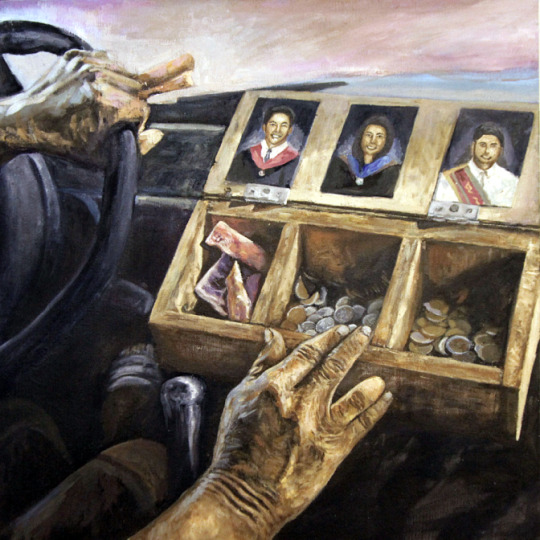
Public Utility Vehicle Modernization Program (PUVMP) is first established as a means to address problems in transportation and the unstable availability of PUVs. Yes, there are outdated and obsolete jeepneys, but I hardly think eradicating all of these jeepneys is the solution.
What I observed is a lack of a system in the routing system. Jeep stops are erratic, and therefore so will their availability and schedule. The unpredictable transport system is one of the reasons for the programs’ creation. I think the government needs to stop scapegoating the problem on the jeep’s reliability alone, and rather create a trustworthy system of routing to be implemented within jeepney associations. And another popular solution coming up is upgrading the traditional jeepneys with modern and appealing designs, but retaining the traditional and very Filipino image and at a lower cost.
No jeepney driver has to fall into debt and their radical response with a strike is completely understandable, but rather the government on the other hand lacks any reasonable response. I think they need to analyze more rather than blankly implement.
5 notes
·
View notes
Text
Citizen Journalism: Midterms Output | BA Journalism 2A (22-23)
Malolos jeepney barker, drivers detest PUV modernization program
#NoToJeepneyPhaseOut continues to be the unyielding stand of both jeepney barkers and drivers of Malolos Central Transport Terminal after the previous nationwide transport strikes caused by the contentious Public Utility Vehicle Modernization Program (PUVMP) of the administration.
Beside Xentro Mall Malolos sits the Malolos Central Transport Terminal that holds public utility vehicles (PUVs), particularly traditional jeepneys, with both roundtrip and one-way trips to neighboring and distant places alike, such as Plaridel, Guiguinto, Marilao, and Santa Maria, among others.
Mang Renato, a jeepney barker for 21 years and a father of six, said that he won’t necessarily be affected by the jeepney modernization. But he makes clear that he sympathizes with traditional jeepney drivers, who will not be able to afford the modernized ones.
"Sana hindi na matuloy yung mga phase out na yan, kawawa yung mga operator", he expressed. "Paano kung walang pera yung mga operator… paano yung mga drayber. Syempre kung walang pera, wala silang dyip na modern", he continued.
Although his livelihood will not be directly affected by the modernization, he stressed out: "Wala naman ding pinagkukunan ‘yan [mga drayber], syempre masakit din sa kanila yan." To add to his sentiment, he said that there were kind drivers who were willing to give him extra income whenever their jeepneys would be full of passengers, thereby adding to his disapproval of the government’s plan.
Mang JR, a traditional jeepney driver for two decades, also strongly expressed his disfavor for jeepney modernization: "Syempre nakasanayan na namin itong gamitin, tsaka dito ‘di masyadong ano… kapag binyahe na namin, sa amin na kita. Eh kapag sa modern babayaran mo sa gobyerno."
He further explained that the government is basically phasing out their jeepneys and leaving them in immeasurable debt, which they cannot afford to pay. "Pabigat talaga samin talaga", he said.
"Napag-aral ko yung mga anak ko… yung pang-araw-araw namin hanggang sa bahay, kuryente [at] tubig, dito kami kumukuha", he added, emphasizing the importance of his job for his family to stay afloat.
As for his opinion about why the government is pushing PUV modernization in the country, he thinks they are trying to raise the standard of the Philippines’ public transport on par with Hong Kong’s minibuses, vehicles used to reach places standard buses cannot.
Fiercely pointing out the flaws of the jeepney modernization, "Bunso", also a traditional jeepney driver for almost three decades, said that should the jeepney phaseout be implemented, there will be a great loss to every jeepney driver’s family.
"Maraming epekto, dahil gawa nga ng yung dyip namin imbis na wala kaming utang, magkakautang kami na malaki: milyon. Yung dyip naming pansarili, magkakaroon kami ng amo ngayon", he expressed.
Among others, what worries him most about such a policy is its effect on the education of their children: "Kahit paano nakakapagpa-aral kami. Ngayon, ‘pag dumating yang modern na yan, baka hindi na kami makapagpa-aral kahit kinder."
He also cannot help but feel bad for fellow drivers who switched to modernized jeepneys because he is certain they are in debt with millions of pesos. "Malaki hulog doon sa modern... tatlong milyon ‘yon", he said.
Asked if he would ever be in favor of the jeepney modernization program, "Kahit kailan, hindi.", he ended.
The sentiments of Mang Renato, Mang JR, and Bunso were only among the many from the transport sector who will be directly affected by the controversial PUV modernization program that most of them believe to be "anti-poor."
The PUVMP was issued way back in 2017 under DOTr Department Order No. 2017-011, also known as the Omnibus Guidelines on the Planning and Identification of Public Road Transportation Services and Franchise Issuance, during the Duterte administration. Its importance was restated by Transportation Secretary Jamie Bautista under the Marcos administration, with the same aim to provide the Filipinos with a safe and environmentally sustainable transportation system despite the expensive transition that would leave most jeepney drivers behind. | via Andrea Apit, Caryl Flores, Athena Morales, & Nash Villena, BA Journalism 2A

#NOTOJEEPNEYPHASEOUT: Short Documentary
#NOTOJEEPNEYPHASEOUT: Short Documentary
#NOTOJEEPNEYPHASEOUT: Short Documentary
1 note
·
View note
Text
[April 29-30]
Mga Pitik sa Tigil Pasada- Jeepney Drivers strike against the PUV Modernization Program










1 note
·
View note
Text
Christians for National Liberation Statement on International Labor Day

Renmin Malaya | Spokesperson | Christians for National Liberation (CNL)
May 01, 2024
“We are afflicted in every way, but not crushed; perplexed, but not driven to despair; persecuted, but not forsaken; struck down, but not destroyed.”
2 Corinthians 4:8-9
The Christians for National Liberation (CNL), the underground revolutionary political organization of Christians, salutes the world’s working peoples as they struggle against multiple crises including neoliberal attacks on livelihood, nature, and sovereignty, state fascism, wars of aggression, and environmental destruction. We commend the efforts of the proletariat in their fight against imperialism and all forms of reaction. In the Philippines, we celebrate their courage and determination in waging the national democratic revolution with a socialist perspective through protracted people’s war. Workers and other toiling people battle against US imperialism, bureaucrat capitalism, and feudalism.
The worsening crisis of world monopoly capitalism has brought never before suffering on the proletariat and other oppressed peoples. The inherent contradictions within capitalist and monopoly capitalist systems lead to the destruction of productive forces and the need to conquer and exploit new markets. Especially in the global South, this has meant a race to the bottom for wages, the destruction of trade unions, and greater immiseration for the working class.
The looming threat of the US-China conflict casts a shadow over the Filipino people, who already face worsening economic conditions due to the chronic crisis of the semi-feudal and semi-colonial system. Farmers struggle against land monopolies and encounter armed security forces and goons hired by the landed class. Amid the drought induced by El Niño, the government’s utter neglect of farmers’ needs leads to widespread water shortages and hunger.
Workers endure exploitation through illegal dismissals and flexible working arrangements to extract super profits from their labor; and repression, including extrajudicial killings. Wages remain low while the prices of basic goods and services soar. Jeepney drivers face challenges from Public Utility Vehicle (PUV) modernization, which threatens their livelihoods.
But these persistent crises, this same monstrous imperialist system—fueling exploitation and oppression—engenders revolutionary resistance led by the proletariat. The inherent contradictions within capitalist and monopoly capitalist systems (social character of production against the private ownership of the means of production) create conditions and opportunities for workers and other marginalized groups to rise against the status quo. The worsening conditions of exploitation and oppression not only make the armed revolution just and necessary but urgent. Painstaking efforts must be made to recover hard-fought democratic rights and trade unions destroyed by state fascism, neoliberalism, and local reaction.
CNL as an allied member organization of the National Democratic Front of the Philippines, conducts and supports all efforts to bring church people and other middle forces to embrace the cause of the proletariat and their historic mission of defeating capitalism and building socialism.
CNL contributes to strengthening the worker-peasant alliance by influencing the petty bourgeoisie and national bourgeoisie to form a strategic alliance in the revolutionary united front. Members champion workers’ rights and promote political work within reactionary institutions. Members stand against US imperialist warmongering and militarization advocate for the lives of the Filipino people, and organize in support of the liberation struggle. Members stand against China’s aggression in the West Philippine Sea.
In the words of the great proletarian revolutionary leader Prof. Jose Maria Sison, “In the continuing era of modern imperialism and proletarian revolution, the role of the proletariat is to turn imperialist wars to revolutionary civil wars and build socialism cannot be underestimated and should be upheld and carried out by the broad masses of the exploited and oppressed peoples. The upsurge of anti-imperialist and democratic mass struggles and the perseverance in people’s wars for national and social liberation are the prelude to the resurgence of the world proletarian-socialist revolution. In this decade and the next decade, the proletariat and its revolutionary forces must work and fight for this resurgence.”
As we reflect on International Labor Day, the revolutionary determination of the Filipino working class remains strong. Fight until total victory!
Long live the Communist Party of the Philippines-New People’s Army!
Long live the National Democratic Front of the Philippines!
Long live the Christians for National Liberation!
Long live the National Democratic Revolution with Socialist Perspective!
Long live the proletariat and the workers movement!
1 note
·
View note
Text

Translation + summary:
Anakbayan on Twitter @anakbayan_ph:
"Why is the fight of the jeepney driver also the fight of the commuter? Why should we act and mobilize?
The mass transport crisis will intensify. The government will not be able to compensate for the huge decrease in public transportation units. Tens of thousands of jeeps will no longer be allowed to operate if they do not abide by the program by surrendering their individual franchises + vehicles and joining cooperatives/corporations to replace the traditional jeeps with "modern jeeps." [As of 2 days ago, ~31k jeeps in Metro Manila have yet to consolidate.] Commuters will be faced with even more difficulties if this happens.
Passenger fares will increase. The PUV Modernization program is a business. The gov wants corporations/coops to have collective ownership over the franchises of routes and new units. They will be able to freely increase fares, which are the only way to cover the costs of providing new jeeps. The fares are projected to reach P40-50, while wages everywhere remain stagnant. [For comparison, current jeepney fares are P13-15.]
The long-term effects of the PUV Modernization program on the state of mass transportation in the country will be massive. It is a complete foreign and corporate takeover of the mass transport system. Local manufacturers and industries will be killed off with the influx of imported vehicles.
Our right to quality transportation that is truly for the masses is at stake. There are 3 days left before the consolidation deadline. There is no other time, we must act now."
#no to jeepney phaseout#no to puv phaseout#philippines#idk if there are many eng-only filipinos here but anw hope this helps 🫶#public transportation#translations
19 notes
·
View notes
Text
Taas-pasahe sa Pampublikong Transportasyon, Umarangkada na noong Oktubre 3
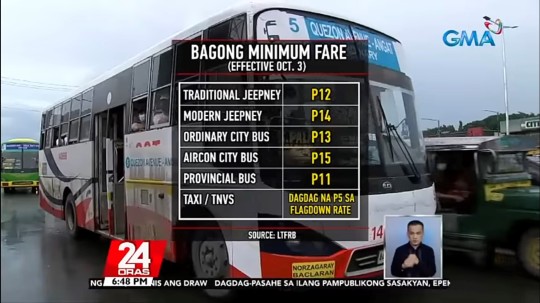
PAGTAAS NG PAMASAHE. Epektibo na noong Oktubre 3, 2022 ang pagtaas ng minimum na pamasahe sa mga pampublikong transportasyon tulad ng dyip, bus at taxi. Larawan mula sa GMA News
Inaprubahan ng Land Transportation Franchising and Regulatory Board (LTFRB) ang pagtaas ng pamasahe sa Public Utility Vehicles (PUVs) noong Setyembre 20, 2022.
Ayon sa isang panayam kay LTFRB Chairperson Cheloy Gerafil, magiging permanente na ang pagtaas ng singil at hindi maaapektuhan ng pagtaas-baba ng presyo ng produktong petrolyo, na naglalaro ngayon sa ₱67 hanggang ₱86 kada litro. Dahil dito, magiging ₱12 na ang minimum na pamasahe sa mga tradisyunal na dyip, habang ₱14 naman para sa mga modern jeepney. ₱2 naman ang dagdag sa mga provincial at city buses, kaya’t magiging ₱11 hanggang ₱15 na ang minimum fare para rito. Tataas sa ₱35 hanggang ₱45 ang flagdown rate para sa mga taxi at Transport Network Vehicle (TNVS). Pinaalalahanan ni Gerafil ang mga operator at driver na bawal maningil ng taas-pasahe kung walang nakapaskil na bagong fare matrix sa loob ng sasakyan.
Apektado ng panukala ang mga dyip na balik-biyahe na sa loob ng UP Campus, kasabay ng pagbabalik ng face-to-face classes sa unibersidad noong Setyembre 5. Kabilang sa mga nagbalik na dyip ay ang mga biyaheng UP Ikot, UP Toki, Katipunan, Pantranco, Philcoa, at SM North Edsa. Inaasahan na makatutulong ang taas-pasahe upang mabawi ng mga drayber ang nawalang kita bunga ng dalawang taong pandemya.
Sa kabilang banda, malaking pasakit sa mga commuter ang nakaambang na taas-pasahe. Isa na dito si Kyle Garcia, isang UPIS Grade 12 student na tatlong beses sa isang linggo sumasakay ng dyip. Ayon kay Garcia, bagaman mas mabilis ang kanyang biyahe kung sasakay, mapipilitan siyang maglakad dahil sa taas ng presyo ng pamasahe.
“Naiintindihan ko kung tumaas ang presyo ng pamasahe para mas mataas ang kita ng mga jeepney drivers. Pero depende kung magkano na ang bagong presyo ng pamasahe, maaaring mas madalas na lang akong naglalakad. Ito ay dahil malapit ang mga pupuntahan ko, mas matagal ngunit mas mura na lumakad na lang.” Nang tanungin tungkol sa mga paraan kung paano mapapabuti ang serbisyong transportasyon sa UP at sa Metro Manila, sabi ni Kyle, “Sana ay [mas] patas [ang] pamasahe upang maging accessible ang pampublikong transportasyon para sa lahat.”
Nagpasalamat naman ang mga transport group sa LTFRB dahil sa naging tugon nito. Humingi naman sila ng pasensya sa mga commuter na maaapektuhan nito. “Malaki pong tulong ito na madagdagan ang aming kinikita,” sabi ni Liberty Deluna, miyembro ng Alliance of Concerned Transport Organizations (ACTO), “Doon po sa aming commuters, humihingi kami ng pasensiya sa kanila dahil kami ay humingi na naman ulit ng panibagong fare increase at naaprubahan po ito.” Epektibo na ang fare hike mula noong Oktubre 3, 2022. //ni Andre Panopio
3 notes
·
View notes
Text

Hᴜʟɪɴɢ Hᴀɴɢɪɴ ɴɢ Isɪɴɪʟᴀɴɢ ɴᴀ Bᴜʜᴀʏ, Uɴᴀɴɢ Hɪɴɢᴀ ɴɢ Sᴜᴍɪsɪʟᴀɴɢ ɴᴀ Aʀᴀᴡ
"The Horizon" ni Ji-Hun Jeong
Entry blg. 03 ‖ Dis. 08, 2023
★★★★★
BABALA: Naglalaman ang blog na ito ng duguan, giyera, horror, at kamatayan.
Isinulat at inilarawan ni Ji-Hun Jeong, isang manhwa o webtoon na serye ang "수평선" — na tinatawag na "The Horizon" sa wikang Ingles — na inilathala online mula Marso 31, 2016 hanggang Hulyo 21, 2016. Mayroon itong tatlong mga volume at may kabuuang 21 na mga kabanata.

Tungkol ito sa dalawang pangunahing mga tauhan: ang batang lalaki, na tatawagin natin na "Boy," at ang batang babae, na tatawagin natin na "Girl," na nagkataon na nakilala ang isa't-isa sa gitna ng digmaan. Noong biglaang nagputukan ang mga sundalo sa giyera, tumakbo sila palayo sa kaguluhan hanggang sa makarating sila sa isang mahaba na kalsada sa gitna ng kawalan. Dahil wala na silang iba pang mapupuntahan, nagpasya silang sundan nalang ang daan na ito upang makita kung ano ang nasa dulo nito.
Sa pagsubaybay ko sa lahat ng mga balakyot na mga pangyayari na haharapin ng dalawang pangunahing tauhan, paulit-ulit na pumapasok sa isip ko ang linya na, "Why do people feel the need to survive?" Bagaman kaagad na matatagpuan ang linya na ito mula sa simula pa lamang, nananatili itong angkop kahit hanggang sa katapusan ng kuwento, ang profoundness nito tumatagos sa aking pang-araw-araw na buhay.
Bakit nga ba? Subalit sa lahat ng mga pagdurusang panay nating nararanasan simula pa sa ating pagkaluwal kasama sa mawalang-pag-asang kalagayan ng mundo ngayon — ang mga genocide na nangyayari sa Gaza, Congo, Sudan, Ukraine, at sa iba pang mga bansa; ang sapilitang pagpapatupad ng PUV Modernization Program; ang patuloy na pagtaas ng mga bilihin na walang kasamang pagtaas ng sahod; climate change na hindi pa natin nahahanapan ng solusyon, atbp. — ano nga ba ang dahilan kung bakit patuloy pa rin tayong gumigising upang harapin ang araw? O marahil isang tanda lamang ng ating katauhan ang patuloy na huminga sa kabila ng lahat?

Sa kalagitnaan ng manhwa, sa wakas nabigyan din ng pagkakataong huminga sina Boy at Girl. Saglit silang nakapag lasap ng kapayapaan at pakikipagkapwa. Ani nga ng tagapagsalaysay, "Regardless of what was happening in the world, they were happy, as long as they were together, hand in hand. The moon and the stars... The birds and the trees... The sky and the clouds... Everything existed for the two."
Ngunit, at dahil nananatiling mabuway at mabagsik at malupit ang buhay, siyang tumagal nga ang mga sandaling ito ng panandalian lamang. Sa saglit na sitwasyon na nabigyan sila ng oportunidad na magpahinga, biglang kinuha si Girl mula kay Boy ng isang missile na galing saanman. Ni-isang babala, ni-isang pagkakataong maghanda. Agad lang na pumanaw si Girl, at walang nagawa si Boy kundi tanggapin ang kaniyang kamatayan, tulad ng madalas na nangyayari sa totoong buhay.
Dumadaan tayo sa ating pang-araw-araw na buhay na patuloy na nawawalan ng mga pagmamay-ari, mga minamahal, o kaya naman mga pangarap — patuloy na nagdadalamhati. Iyak ng iyak, trabaho ng trabaho, hinayang ng hinayang, ngunit patuloy parin ng patuloy. Saan nga ba patungo ang ating munting mga buhay?

"Everything is futile. And I'm afraid."
Bakit ko ba binasa ang manhwa na ito? At bakit ko ito pinaglaanan ng oras upang tapusin? Bakit ninanais ko na magkaroon ng mataas na marka para sa paksa na Filipino 5 na siyang dahilan kung bakit pinagsisikapan ko ang pagsulat ng mga blog na ito? Bakit sibak na sibak akong magaral upang makapag-tapos at makapag-aral ng kolehiyo sa ibang bansa? Bakit patuloy ko pa rin pinipili na pagbigyan ng pagkakataon ang aking sarili at ng pag-asa ang aking kinabukasan, sa kabila ng lahat ng mga oras na sinubukan kong tapusin ang lahat?









Sa aking matalik at tanging kaibigan, I owe you my life.
Sanggunian:
Jeong, J.H. (2016, Marso 31). The Horizon. https://thehorizonmanga.com/
Jeong, J.H. (2021, Enero 13). Where must we go?.jpg. Twitter. https://twitter.com/Sufferent/status/1349156493866594304
Jeong, J.H. (2023, Oktubre 19). The Result of War.webp. Spielanime. https://www.spielanime.com/manga/the-horizon-manhwa-is-better-than-most-seinen-is-the-start-of-a-new-generation/
Jeong, J.H. (2023, Oktubre 19). Why has the world turned out this way?.webp. Spielanime. https://www.spielanime.com/manga/the-horizon-manhwa-is-better-than-most-seinen-is-the-start-of-a-new-generation/
0 notes
Text
PUV Modernization Key to Solving Manila Traffic Woes

Transforming Metro Manila's Traffic Landscape
The Public Utility Vehicles Modernization Program, a pivotal initiative by the Philippine government, is set to address the persistent traffic problem in Metro Manila. This ambitious program draws inspiration from successful models like Singapore's, aiming to revolutionize the way Filipinos commute.
A Leap Towards Efficient Urban Transport
Orlando Marquez, the national president of Liga ng Transportasyon at Operator ng Pilipinas (LTOP), emphasized the potential of the PUV modernization in solving Metro Manila's traffic woes. Speaking at a forum in Quezon City, Marquez highlighted how Singapore overcame similar challenges through transport modernization.
"We fully support this modernization because we want to emulate successful countries like Singapore, where traffic used to be a major issue," Marquez stated.
Enhancing Commuter Experience
Marquez further noted that the modernization of public utility vehicles in the Philippines is not just about easing traffic. It's also about providing comfort to the Filipino workers, the majority of whom commute daily. This initiative promises a significant improvement in the daily travel experience of millions of Filipinos.
Beyond Local Borders: The Export Potential
An intriguing aspect of the PUV modernization is the Philippines' potential to produce vehicles that could be exported internationally. Marquez urged not to settle for the 'only in the Philippines' mindset but to aspire for global recognition of Filipino-made vehicles.
"Let's aim to sell our locally made and designed vehicles to other countries," he added.
The Need for Road Rationalization
While advocating for PUV modernization, Marquez also stressed the importance of starting with "road rationalization." This strategy is crucial to minimize inconvenience to commuters and the riding public during the transition phase. It involves optimizing road use and traffic management to complement the modernization efforts.
Situation Review
The PUV Modernization Program is a beacon of hope for resolving Metro Manila's traffic crisis. By emulating successful models like Singapore's and focusing on both commuter comfort and vehicle export potential, the Philippines is on the brink of a significant transformation in its urban transport system.
Sources: THX News & Presidential Communication Office.
Read the full article
#EfficientPublicTransport#FilipinoCommuters'Comfort#NationalTransportDevelopment#PublicUtilityVehiclesinPhilippines#PUVModernizationProgram#RoadRationalizationStrategy#SingaporeTrafficModel#TrafficSolutioninMetroManila#TransportSystemImprovement#VehicleExportPotential
0 notes